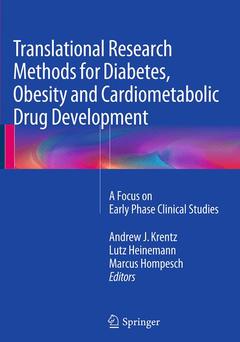Translational Research Methods for Diabetes, Obesity and Cardiometabolic Drug Development, Softcover reprint of the original 1st ed. 2015 A Focus on Early Phase Clinical Studies
Coordonnateurs : Krentz Andrew J., Heinemann Lutz, Hompesch Marcus

Provides a background to aid the understanding of drug effects and non-drug treatment strategies on key biochemical-hormonal defects of obesity and type 2 diabetes
Aids the selection of the most appropriate techniques for assessing insulin action, insulin secretion and body composition in humans?
Provides practical examples to assist usage/applications, explanation and study analysis
Perils and pitfalls are summarized for each technique
Date de parution : 09-2016
Ouvrage de 312 p.
17.8x25.4 cm
Thèmes de Translational Research Methods for Diabetes, Obesity and... :
Mots-clés :
cardiometabolic; efficacy; glucose clamp; insulin resistance; obesity; type 2 diabetes; diabetes; metabolic disease



